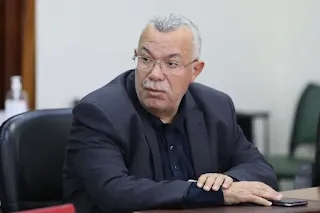Al-Buhairi affirmed that his party will interact responsibly with Fakhfakh’s request for social access
The Tunisian Ministry of the Interior ended, late on Monday, the house arrest decision against Noureddine Al-Behairi, Vice President of the Ennahda Party, and the former official in the Ministry of Interior, Fathi Al-Baldi.
And since last December 31, the authorities announced the placement of Al-Buhairi and Al-Baladi under house arrest.
The ministry said - in a statement published yesterday, Monday on its official Facebook page - "After implementing two decisions to house arrest on Tunisians, on December 31, 2021, and according to the presence of judicial research on the matter, it was referred to the judiciary (...) and following the establishment of the Interim Supreme Judicial Council; Termination of the effect of the decisions of house arrest taken against the two persons concerned.
The statement of the Tunisian Ministry of Interior added, "The house arrest decision has been lifted from the two concerned persons, so that the judiciary can complete the necessary research and judicial procedures in their regard."
The statement added that the house arrest "was in full respect for human rights in terms of allowing visits, residence and medical care," and said that "both of the aforementioned persons are in a normal health condition, according to medical reports, the latest of which was the date of the end of house arrest (Monday)."
The statement indicated that "the governor of Bizerte (northern Tunisia, where Al-Buhairi was hospitalized) and the governorate of Manouba (west of the capital, the place of the municipal suspension in Mornaguia prison) have been assigned to complete the obligations of implementing the decisions to end the effect of house arrest.
And last Sunday, Al-Buhairi's defense team announced that he refused to end his hunger strike, and renewed the responsibility for his physical safety on Interior Minister Tawfiq Sharaf El-Din and all those responsible for his "kidnapping and arbitrary detention."
Since last July 25, Tunisia has been experiencing a severe political crisis, when its president, Kais Saied, began imposing exceptional measures; These include freezing the powers of Parliament, issuing legislation by presidential decree, dismissing the government and appointing new ones.
Most of the political and civil forces in Tunisia reject these measures, and consider them a "coup against the constitution", while other forces support them and see them as a "correction of the course of the 2011 revolution," which overthrew the late President Zine El Abidine Ben Ali.





